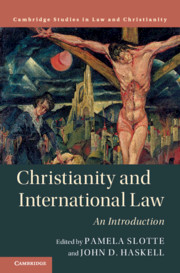Book contents
- Christianity and International Law
- Law and Christianity
- Christianity and International Law
- Copyright page
- Dedication
- Contents
- Tables
- Contributors
- Acknowledgments
- 1 Christianity and International Law: An Introduction
- 2 The Byzantine Commonwealth and the Emerging Features of a Law of Nations in the First Millennium
- 3 Christianity and the Birth of Ambassadorial Deontology: Some Historical Notes
- 4 Formation and Refiguration of the Canon Law on Trade with Infidels (c.1200–c.1600)
- 5 God, Sovereignty, and the Morality of Intervention outside Europe
- 6 The Significance of Christian Charity to International Law
- 7 Hugo Grotius: On Freedom of the Seas and Human Nature
- 8 Ius gentium et naturae: The Human Conscience and Early Modern International Law
- 9 Legalizing Antisemitism? The Legacy of Savigny’s Roman(tic) Law
- 10 Missionary Knowledge and the Empirical Foundations of Modern International Legal Thought
- 11 Standards for a Righteous and Civilized World: Religion and America’s Emergence as a Global Power
- 12 International Protestantism and Its Changing Religious Freedoms
- 13 Beyond the Freedom of Worship: The Contested Meaning of Religious Freedom in International Human Rights Law and Politics, 1945–1967
- 14 Process Theology and a Pluralistic Foundation for Human Rights
- 15 Christianity and Human Rights Law: Orthodox Perspectives
- 16 Conquest, Sacred Sites, and “Religion” in a Time of Crisis
- 17 Constantine’s Legacy: Preserving Empire While Undermining International Law
- 18 Hopelessly Practicing Law: Asylum Seekers, Advocates, and Hostile Jurisdictions
- 19 The Hidden Theology of International Legal Positivism
- Select Bibliography
- Index
- References
15 - Christianity and Human Rights Law: Orthodox Perspectives
Published online by Cambridge University Press: 17 May 2021
- Christianity and International Law
- Law and Christianity
- Christianity and International Law
- Copyright page
- Dedication
- Contents
- Tables
- Contributors
- Acknowledgments
- 1 Christianity and International Law: An Introduction
- 2 The Byzantine Commonwealth and the Emerging Features of a Law of Nations in the First Millennium
- 3 Christianity and the Birth of Ambassadorial Deontology: Some Historical Notes
- 4 Formation and Refiguration of the Canon Law on Trade with Infidels (c.1200–c.1600)
- 5 God, Sovereignty, and the Morality of Intervention outside Europe
- 6 The Significance of Christian Charity to International Law
- 7 Hugo Grotius: On Freedom of the Seas and Human Nature
- 8 Ius gentium et naturae: The Human Conscience and Early Modern International Law
- 9 Legalizing Antisemitism? The Legacy of Savigny’s Roman(tic) Law
- 10 Missionary Knowledge and the Empirical Foundations of Modern International Legal Thought
- 11 Standards for a Righteous and Civilized World: Religion and America’s Emergence as a Global Power
- 12 International Protestantism and Its Changing Religious Freedoms
- 13 Beyond the Freedom of Worship: The Contested Meaning of Religious Freedom in International Human Rights Law and Politics, 1945–1967
- 14 Process Theology and a Pluralistic Foundation for Human Rights
- 15 Christianity and Human Rights Law: Orthodox Perspectives
- 16 Conquest, Sacred Sites, and “Religion” in a Time of Crisis
- 17 Constantine’s Legacy: Preserving Empire While Undermining International Law
- 18 Hopelessly Practicing Law: Asylum Seekers, Advocates, and Hostile Jurisdictions
- 19 The Hidden Theology of International Legal Positivism
- Select Bibliography
- Index
- References
Summary
As stated by the editors, this volume addresses the topic of Christianity and international law within the broader conversation about the relevance of religion in the dynamics of global governance. Human rights law is one of the most important elements of international law and there are several dimensions of its relation to Christianity – historically, institutionally, and theologically – that generate theoretical concern. One such dimension is that of Christian agencies within the genealogy and historical developments of human rights law. As demonstrated in several chapters of this volume, an analysis of Christian agencies brings new insights into the research field of international human rights law.
Another dimension of the relationship between Christianity and human rights law is the issue of Christianity as a resource for critique of the contemporary human rights law. Such a critique might have impact on legitimacy as well as on efficiency of the human rights instruments, and it cannot but be framed in particular settings of various Christian traditions and communities.
Keywords
- Type
- Chapter
- Information
- Christianity and International LawAn Introduction, pp. 317 - 336Publisher: Cambridge University PressPrint publication year: 2021

